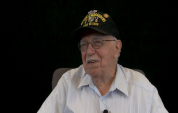4:15 | Bob Passanisi was shocked when he disembarked in Bombay. How could the the USA send him to such a place? The locals were shocked by the GI's casual shower habits and the food was horrible. At least when he visited the Taj Mahal, it was pleasant. (This interview made possible with the support of COL ROBERT W. RUST, USMCR (ret.) in honor of LtGen Lawrence Snowden & LtGen George Christmas.)
Keywords : Merrill's Marauders Bombay India British Indian Hindu shower Taj Mahal Agra

When seventeen year old Bob Passanisi saw the movie Bataan, he went straight to the recruiting office. Since he knew radio repair, he wound up in the signal corps. After training, he didn't want to deploy with the OCS washouts he was surrounded with, so he volunteered for an unknown assignment. (This interview made possible with the support of COL ROBERT W. RUST, USMCR (ret.) in honor of LtGen Lawrence Snowden & LtGen George Christmas.)
He had volunteered for an unknown assignment. All he knew that he was going overseas, so Bob Passanisi shipped out from San Francisco. The young radio repairman curried favor with the captain on the Pacific crossing and was rewarded with superior grub. (This interview made possible with the support of COL ROBERT W. RUST, USMCR (ret.) in honor of LtGen Lawrence Snowden & LtGen George Christmas.)
The trek across India was slow because the railroad gauge changed frequently and Bob Passanisi had to change trains every time. He spent three months in a tent in an empty field while the British command wondered what to do with the American volunteers. (This interview made possible with the support of COL ROBERT W. RUST, USMCR (ret.) in honor of LtGen Lawrence Snowden & LtGen George Christmas.)
General Joseph Stilwell wrested control of the American volunteer unit away from British command and put General Frank Merrill in charge. The diverse unit included Bob Passanisi, who was in charge of the radios. They began a march through India as a ragged and undisciplined group, but as they approached combat, they gelled into a superior fighting force. (This interview made possible with the support of COL ROBERT W. RUST, USMCR (ret.) in honor of LtGen Lawrence Snowden & LtGen George Christmas.)
Finally, they were in Burma. The unit that would become known as Merrill's Marauders worked out their nervousness by firing at the first noise they heard in the jungle. Bob Passanisi was the radio repairman, but his M-1 was expected on the line. This was going to be the first time the Japanese were up against the modern firepower of the M-1 and the BAR. (This interview made possible with the support of COL ROBERT W. RUST, USMCR (ret.) in honor of LtGen Lawrence Snowden & LtGen George Christmas.)
In their campaign through Burma, Merrill's Marauders relied on mules for transporting much of their gear. Bob Passanisi was in charge of the radios and he was also in charge of a mule for carrying the heavier equipment. (This interview made possible with the support of COL ROBERT W. RUST, USMCR (ret.) in honor of LtGen Lawrence Snowden & LtGen George Christmas.)
Bob Passanisi recalls a perilous trek along a mountain trail in Burma as Merrill's Marauders attempted to out-maneuver the Japanese. It was so dark that radium compass dials and phosphorescent plants were relied upon to follow the man, or mule, in front of you. (This interview made possible with the support of COL ROBERT W. RUST, USMCR (ret.) in honor of LtGen Lawrence Snowden & LtGen George Christmas.)
Surprise was a big part of Merrill's Marauders' campaign against the Japanese. Bob Passanisi describes one such attack which caught them unaware. Operating in the jungle was a challenge, and food and water were never in good supply. Most of their meals consisted of the dreaded K-ration. (This interview made possible with the support of COL ROBERT W. RUST, USMCR (ret.) in honor of LtGen Lawrence Snowden & LtGen George Christmas.)
When Merrill's Marauders got hold of a couple of artillery pieces, they were so well positioned that the Japanese could not hit them. The thing they could not ward off, however, was malaria, and it finally caught up with Bob Passanisi. He thought he was goldbricking when he was evacuated. (This interview made possible with the support of COL ROBERT W. RUST, USMCR (ret.) in honor of LtGen Lawrence Snowden & LtGen George Christmas.)
He thought he was a slacker, but when Bob Passanisi was evacuated with malaria, he was unconscious for two weeks. Once recovered, he rejoined Merrill's Marauders, where the unit was beginning to have trouble with green replacements and ineffective Chinese allies. (This interview made possible with the support of COL ROBERT W. RUST, USMCR (ret.) in honor of LtGen Lawrence Snowden & LtGen George Christmas.)
Bob Passanisi recalls a couple of close call incidents from his time with Merrill's Marauders in the jungles of Burma. (This interview made possible with the support of COL ROBERT W. RUST, USMCR (ret.) in honor of LtGen Lawrence Snowden & LtGen George Christmas.)
The artillery rounds were usually high overhead, aimed at the nearby air strip. But, one day, the Japanese dropped some rounds right where Bob Passanisi was bivouacked. (This interview made possible with the support of COL ROBERT W. RUST, USMCR (ret.) in honor of LtGen Lawrence Snowden & LtGen George Christmas.)
It was a leisurely trip home from Burma for Bob Passanisi, but the liberty ship stopped in nearly every port in the Pacific. Once he was home, he attacked all the milk and meat he could find. (This interview made possible with the support of COL ROBERT W. RUST, USMCR (ret.) in honor of LtGen Lawrence Snowden & LtGen George Christmas.)